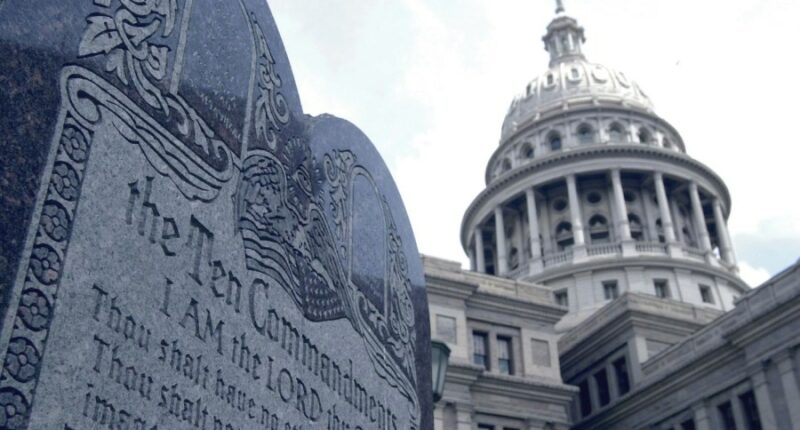Share this @internewscast.com

State laws mandating the display of the Ten Commandments in public school classrooms have repeatedly faced defeats in court, yet advocates remain hopeful for a win at the Supreme Court level.
Supporters of such laws in Louisiana, Arkansas, and Texas are believed by outside observers to be strategizing to bring their cases to the Supreme Court. Despite these efforts, they continue to encounter legal setbacks, even in some of the nation’s most conservative jurisdictions.
Lawsuits argue that these laws infringe upon the First Amendment rights of students and parents by requiring Ten Commandments posters. Nevertheless, proponents think the current Supreme Court might have a different perspective on the issue.
“I don’t think anybody is surprised that these policies, these laws in the states that seek to put the Ten Commandments back in schools, have been challenged in court. They’re making their way through the proper channels, and we still are very confident that at the end of the day, when these cases get to the Supreme Court, that they’re going to uphold them based on the new history-and-tradition test,” said Matt Krause, of counsel with the First Liberty Institute.
The so-called Lemon test that was previously used to determine whether a measure violated the Establishment Clause was undone in the high court’s 2022 Kennedy v. Bremerton School District decision, which determined a public school football coach’s First Amendment rights were violated after he was suspended for praying on fields after games.
“I think once they threw out the Lemon test and instituted this history-and-tradition test, there’s really no way for this — this matter that was decided under the Lemon test — to be fully resolved without the Supreme Court speaking on it, and so they’ve given us the history-and-tradition test, but it hasn’t been fleshed out necessarily in the last several years,” Krause said.
“This Ten Commandments case, I think, helps give the justices the opportunity to provide even more of a framework of what they started in Kennedy,” he added.
When the U.S. Court of Appeals for the 5th Circuit, considered perhaps the most conservative such court in the country, ruled last month that Louisiana’s Ten Commandments law is unconstitutional, it made a point to note “it is the Supreme Court’s ‘prerogative alone to overrule one of its precedents.’”
But opponents of the laws say it is not a done deal the Supreme Court would side with them, let alone even decide to take up the cases.
“The problem is, I just don’t think the court itself — this court — would be friendly to a claim that it’s permissible to post the Ten Commandments in the public schools. In other words, I think [proponents] are operating on a misconception,” said Bob Tuttle, professor of law and religion at the George Washington University Law School.
“So the people that won the case in Kennedy vs. Bremerton School District made a big point of going around and telling the school districts that all kinds of things had changed in the law now, and they were free to bring religion back into public schools, and that is not what the case stood for at all,” Tuttle added.
The 6-3 majority conservative justices have tended to side with right-wing concerns on religion and education, including this term when they ruled along ideological lines in favor of parents who sought to remove their children from instruction that included LGBTQ-themed books.
But the high court also rejected the nation’s first openly religious charter school in a 4-4 decision after Justice Amy Coney Barrett recused herself.
“I don’t think the Supreme Court is going to see this, and if they did see it, they would be forced to make a choice. I mean, they would be forced to really confront radical change in Establishment Clause law affecting the teaching in schools, and they have not done that,” Tuttle said.
Others argue there have been signs throughout the whole process that Republicans were aiming to create a more friendly court to push this sort of legislation through.
Emily Witt, senior communication and media strategist for Texas Freedom Network, pointed to state lawmakers rejecting all amendments to the Ten Commandments legislation besides one where the state attorney general would have to represent school districts if the law was challenged.
“I think that says that they are expecting to be that this bill will result in a lawsuit, which is a misuse of taxpayer funds, and also says, you know, that you’re trying to pass something that is not constitutional,” Witt said.
“In this case, from our perspective, there’s been a decades-long strategy on the right to stack the courts, to pass legislation that is going to have to go through a judicial process because it really tests the boundaries of the Constitution, and so that that is a big worry for us, that this could go to the Supreme Court, and unfortunately … [it] could rule in a way that, from our perspective, does not respect our Constitution,” she added.










